More Consultants?
At the BOCC meeting tomorrow, we will hear an agenda item to sign a contract with Inspire Placemaking Collective to update our comprehensive plan. This will come at an estimated cost of $560,285 over a 16 month period. This company will be updating the comprehensive plan and bringing it up to date. The idea is to use several public workshops and things of that nature to get community input into what they want the comp plan to look like and then balance that with the staff/BOCC opinions. There will be surveys and a website to provide information and ask the community for input.
Sounds great right?
I have a few questions.
#1) Funding. According to the agenda item, the funding for this is coming out of reserves from the Capital Improvement Plan (CIP) over the next two budget cycles.
The question here is does this qualify as a CIP project? According to the county website, a CIP project is defined as:
"A capital improvement project is defined as any new building, equipment, additions to existing structures, purchase of structures, the purchase of land in conjunction with new or existing structures, and road and bridge projects that would normally have a life of at least ten (10) years and a initial cost of greater than $50,000."
I understand that planning/engineering costs are included in the CIP budgets and that this would be a non-recurring project, but I am not sure that the comp plan update produces a physical capital product, as stated in the CIP.
Should we be using CIP funds for this or save those for things like Pirates Cove?
2) Can we do this in house? Why are we hiring consultants to update the comp plan at $560k over 16 months? Is this something that can be done in house? Maybe we dont have the staff for this at the moment, but is it something that we can hire an additional employee to handle? Would that be cheaper than $560k over 16months? Could that employee also help us with things like Land Development Code adjustments and things like that? As we continue to grow and will face other similar issues, would it be wise to hire someone specifically for this type of work, if we do not already have someone?
Here is the scheduled fee payments.
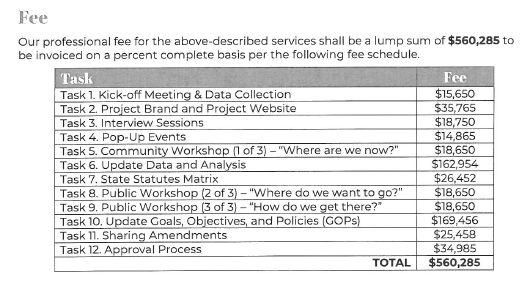
3) Why are we doing the piggyback option and not doing our own bid? Honestly, I have never heard of this before. Basically, governments can "piggyback" off other government contracts. If they like a contract another government signed, they can use those bid documents and sign the same (or similar) contract with the firm(s) awarded. This allows governments to bypass the bidding process (and the time it takes to do those).
Kinda cool and I never knew that was a thing. I learn stuff all the time as well.
However, that raises a question. Why did we choose Inspire?
When doing a piggyback, the requesting department is supposed to send in the bids and the bid tabulations from the initial RFP/RFQ to the Department of Management and Budget (DMB) when asking to piggyback. The original RFP is included in the agenda packet, but the tabulations are not.
I have pending records requests out there for that information, but curious why commissioners do not see the tabulation sheets.
So I did some research and got them myself (gotta love public documents).
The original RFP was seeking firms to help the City with planning over 9 different categories: Multimodal Transportation, Economic Analysis, Communications and Public Involvement, Land Use and Redevelopment, Urban Design, Historic Preservation, Community Resilience, Community Development and Redevelopment and Recreation Master Planning.
Each firm was scored on each category based on 1) Ability of Firm's Professional Personnel (35 total points) 2) Firm's Experience with projects of a similar size and type (30 total points) 3) Demonstrated Understanding of sub area (30 total points) and 4) If they were registered with the state as a minority business (5 total points).
Here are the tabulation sheets
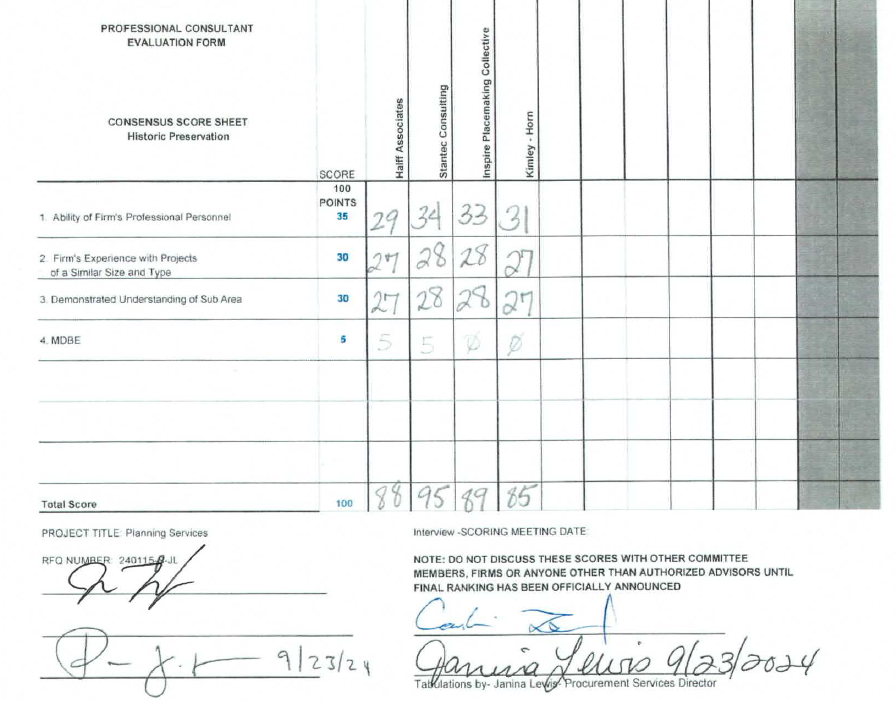
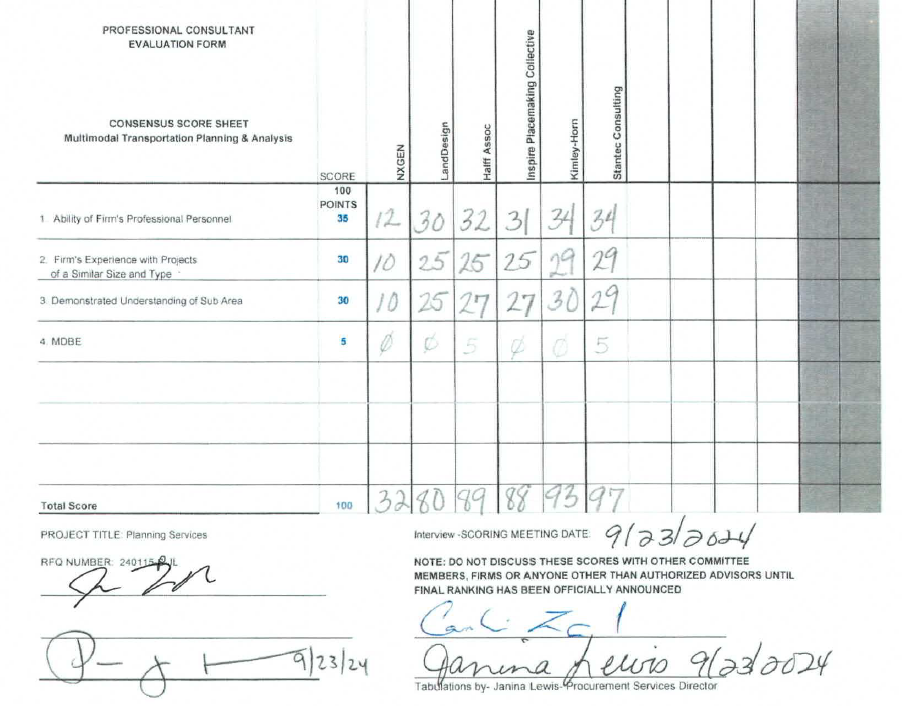
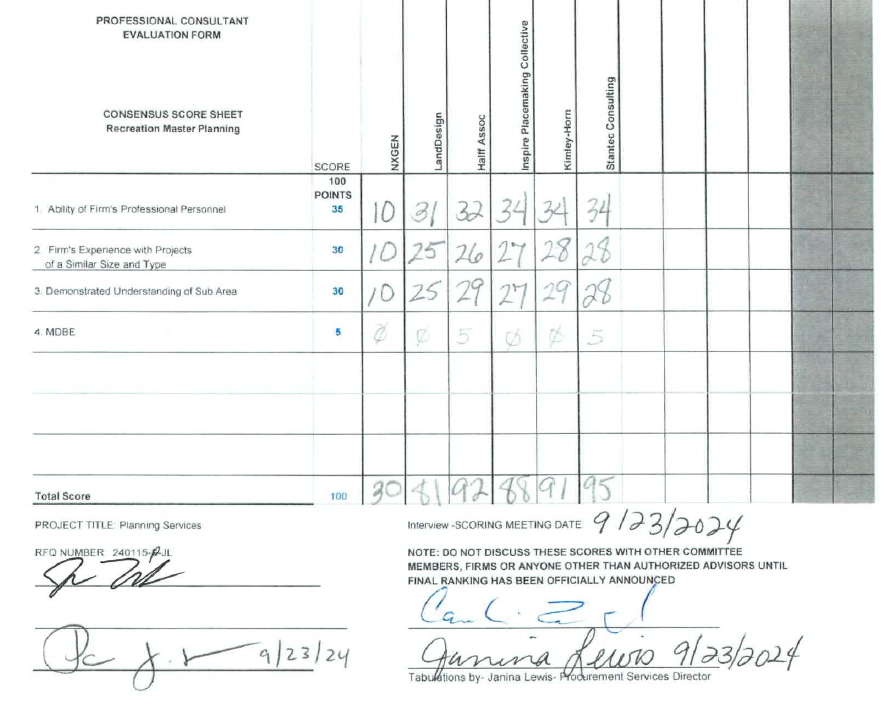
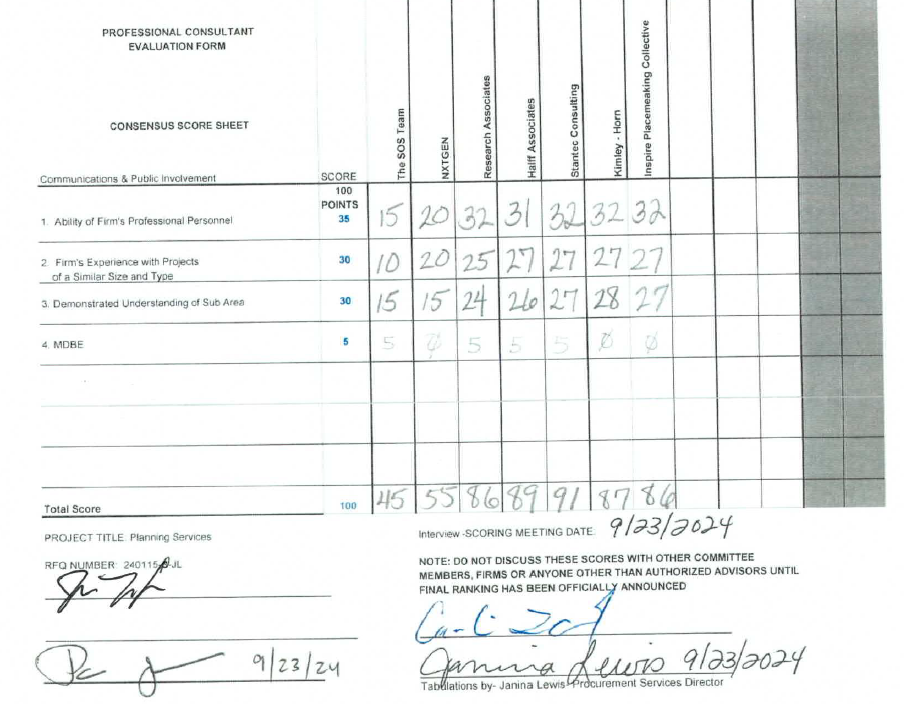
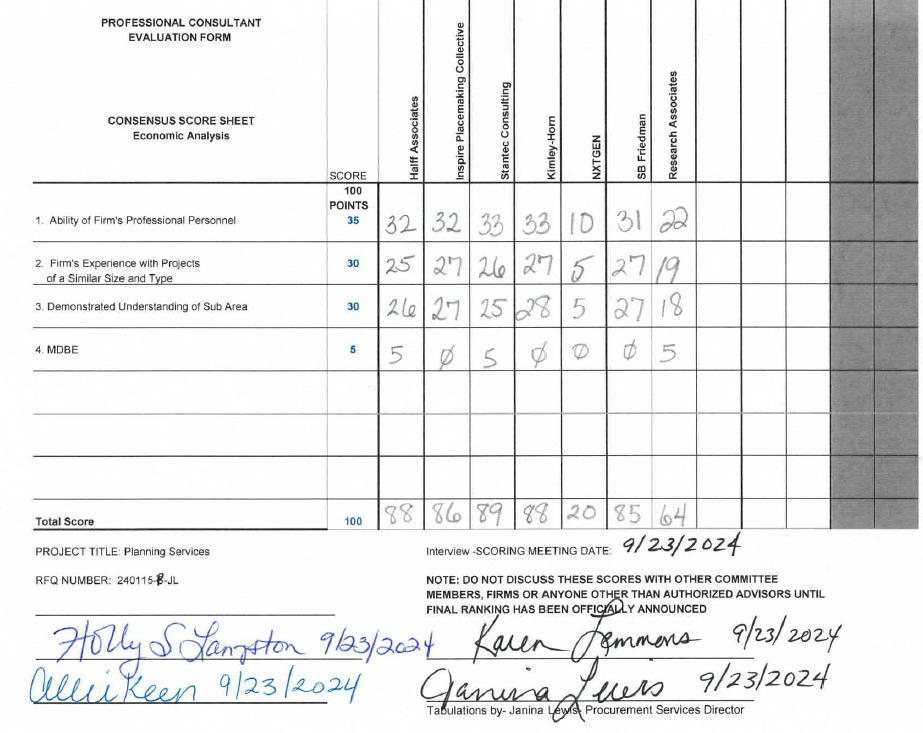
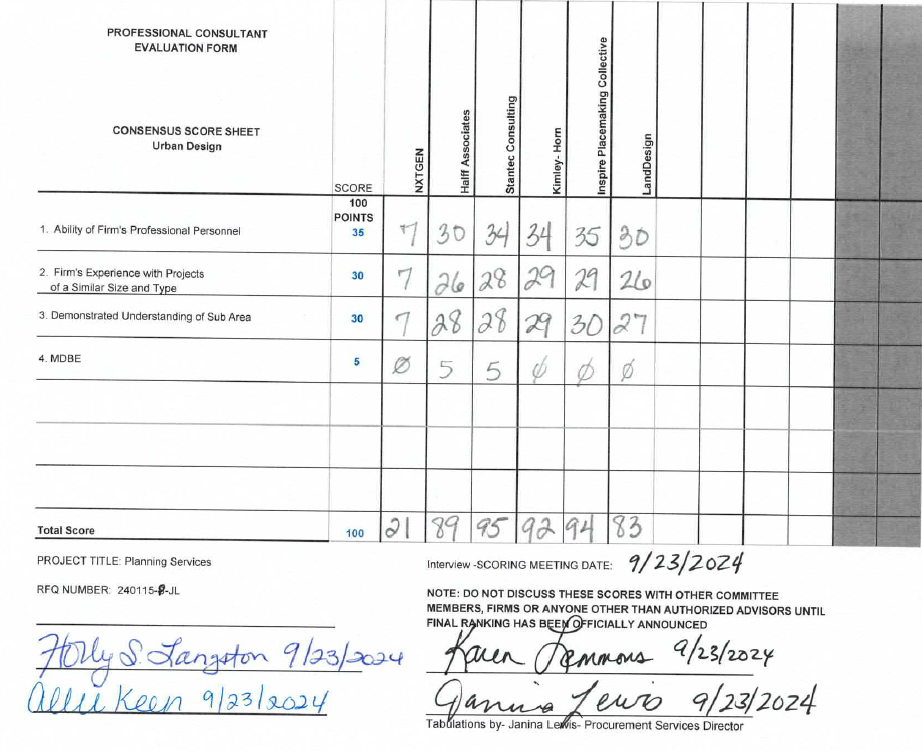
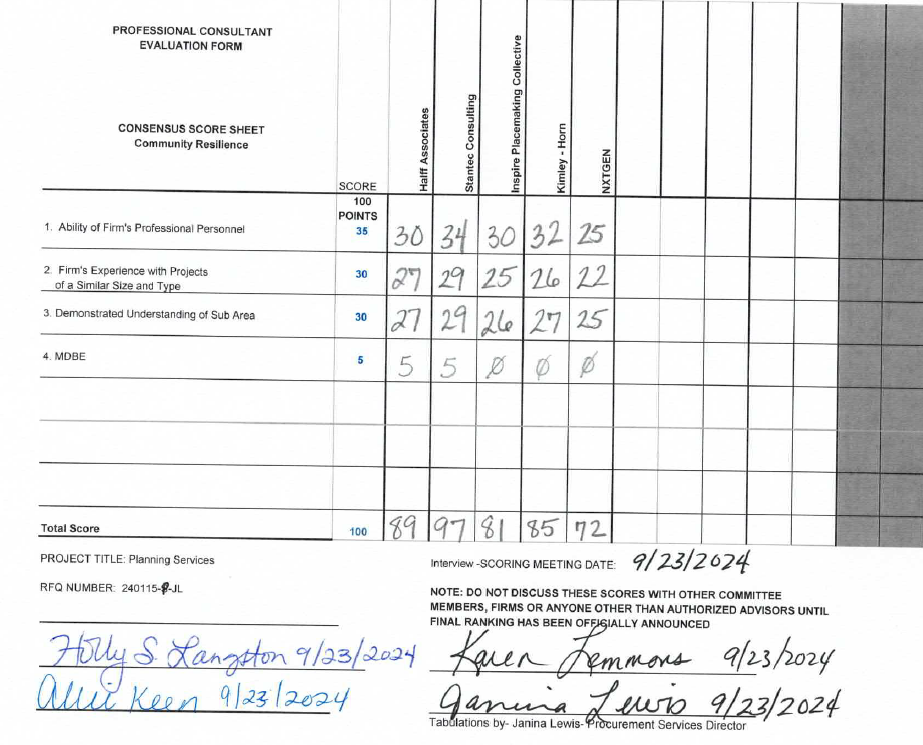
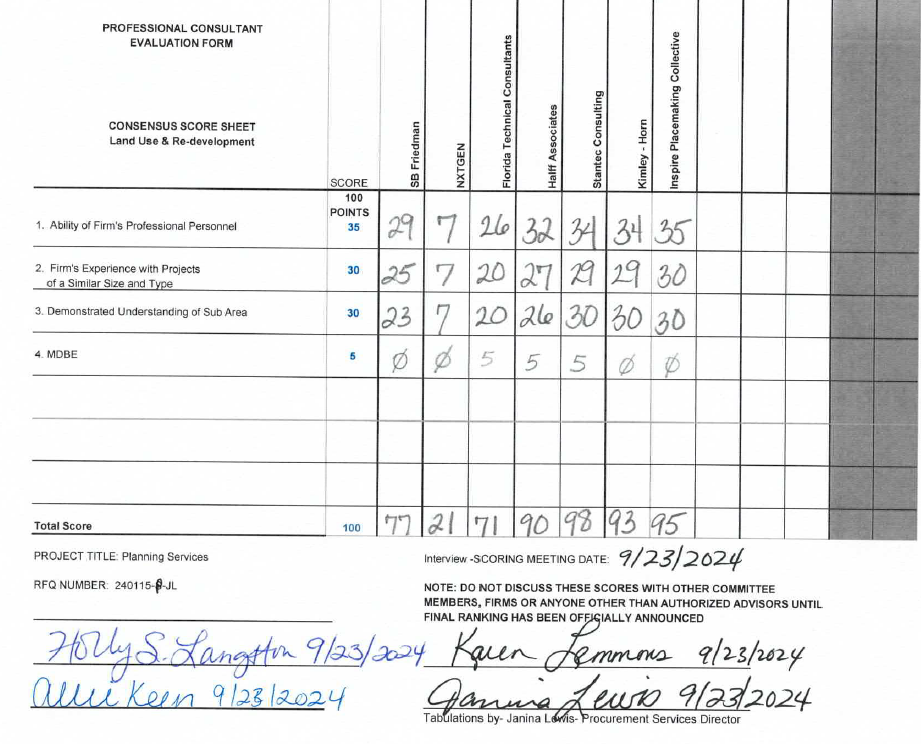
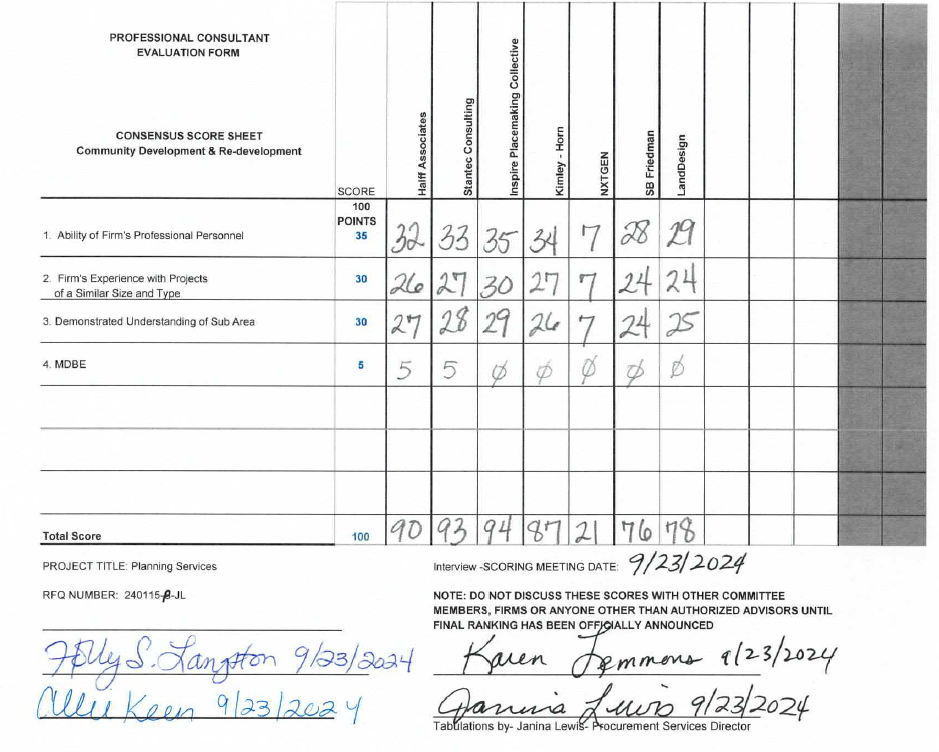
Notably, Tarpon Springs awarded the contract to 6 firms who had scores over 85 in one or more category. The city could choose which ones to use for various projects. They included a check list of firms that were qualified for each of the subcategories.
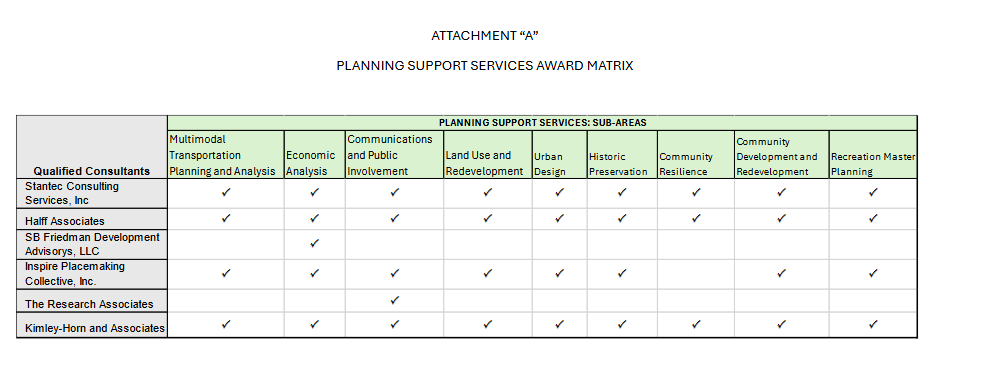
Inspire was not included in the qualified list for all 9 categories. They failed qualification for "Community Resilience". Failing means not scoring above an 85 in that category. Based on the RFP, that includes the following:
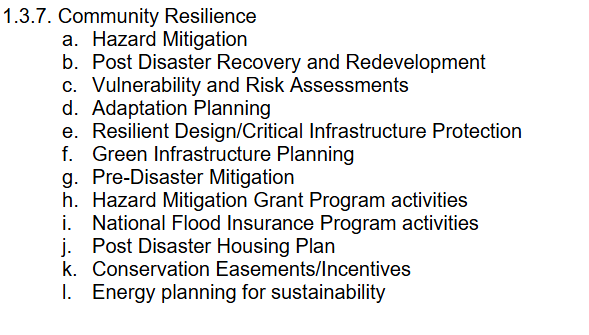
Seems like for an area like Citrus County that has a bit of flooding, especially in Crystal River, this would be a pretty big area to focus on, yet, Inspire did not qualify for Tarpon Springs in this area... hmmm.
Remember, piggybacking is taking what another government decided and applying it locally. So we are taking what Tarpon Springs decided and applying it to Citrus County, yet, we are choosing a firm that Tarpon Springs decided was not qualified in an area that would be important here?
Also, Inspire was not the highest point total in several categories. Here is where they rank.
- Economic Analysis - 3rd
- Urban Design - 2nd
- Community Resilience - 4th
- Land Use and Re-development - 2nd
- Community Development and Re-development - 1st
- Historic Preservation - 2nd
- Multimodal Transportation Planning and Analysis - 4th
- Recreation Master Planning - 4th
- Consensus Score Sheet - Tied for 4th
Now, Tarpon Springs does award additional points (5) for companies that are registered with the state as minority business status, which are companies that have at least 51% ownership by US citizens belonging to a minority group. Citrus County does not have this, so if we take out those points, here is where Inspire stands.
- Economic Analysis - 2nd
- Urban Design - 1st
- Community Resilience - 4th
- Land Use and Re-development - 1st
- Community Development and Re-development - 1st
- Historic Preservation - 2nd
- Multimodal Transportation Planning and Analysis - Tied for 2nd
- Recreation Master Planning - 2nd
- Consensus Score Sheet - Tied for 1st
Granted, when piggybacking, we are supposed to take their scoring, but for the sake of discussion, removing the minority business status from the tabulations, makes them jump a bit in some categories
But the question remains.... This is the company that was chosen? Why? Why was Stantec (1st in most categories) not invited for a presentation last week? They are the company we hired to do our impact fee study. Why not bring them in for this?
But more importantly, why are we even piggybacking off of Tarpon Springs? Why not do our own bid process and get a product that WE want/need vs what Tarpon Springs decided they wanted/needed. I get it speeds things up by a month or two, but shouldn't we be scoring this based on what is best for Citrus County and asking for bids that represent that?
4) How successful is the public outreach of their services? Commissioners seemed intrigued by this idea as it would allow public input into the comp plan.
But I heard Commissioner Bays ask this question point blank.... "What was the response rate in Pasco County with their 600k+ people"?
The answer was kind of shocking. The commissioners were told only 300 people showed up to the workshops and pop up meetings throughout the community. 1,500 people replied to the surveys and the website had 10k views, although they did not say if they were unique views.
Pasco has a population of 659k people. Doing a calculation to get a proper sample size would show that only 384 people are needed for a 95% confidence level and 5% margin of error. So they hit that with the surveys but missed with the in person meetings.
If we want to see a 99% confidence level with a 2% margin of error, the sample size increases 4,135 people, which is missed by this group. Further, they admitted that their techniques are not statistically sound. If we wanted the statistically sound techniques, it would take more time and cost more money. Interesting.
5) Will the BOCC listen to the citizens? Inspire did this process with Sumter County. The results were that its citizens did not want more growth. You can view the website for Sumter and see the PDF presentation files on the right at this link.
If Citrus County citizens say the same thing... stop the growth...stop the upzoning... keep it "rural"... will BOCC listen?
They might say the opposite as well. Maybe citizens say the want more mixed use areas with higher densities and commercial mixed in. I think it will be good for the studies to be done, but can the county do those without a consultant? I don't see why not.
My concern here is that we are choosing firms that do not work with our type of county. Here is the client list on Inspire's website.
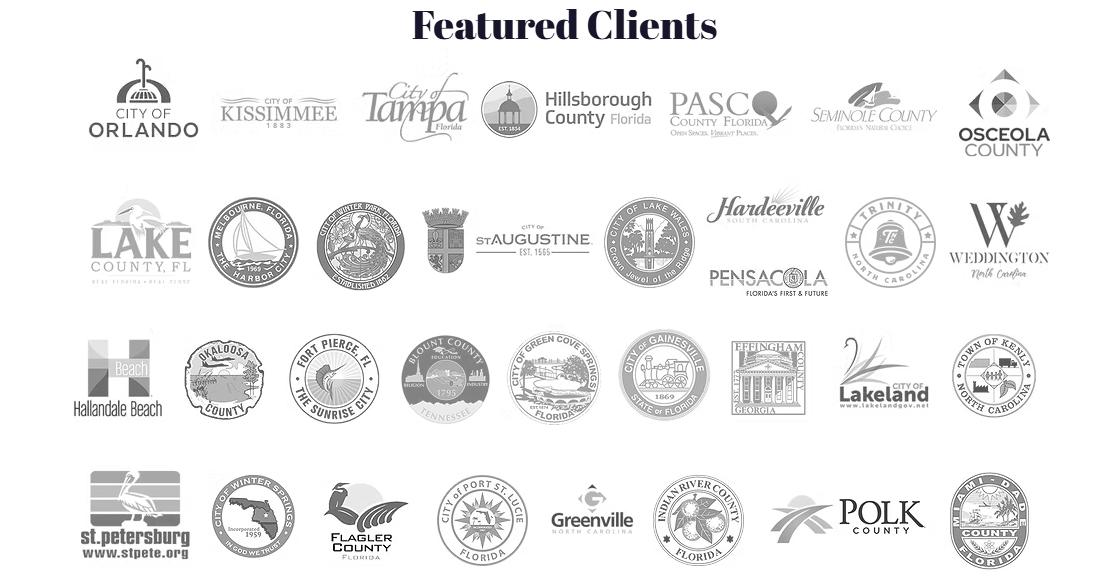
I do not see too many Citrus County type areas. Flagler is perhaps the closest one to Citrus County. The rest are much higher populations and higher densities. Flagler is also a higher density than Citrus at 291.99 people per square mile vs 213.45 people per square mile in Citrus.
Is this company a good fit for Citrus County and what we need?
